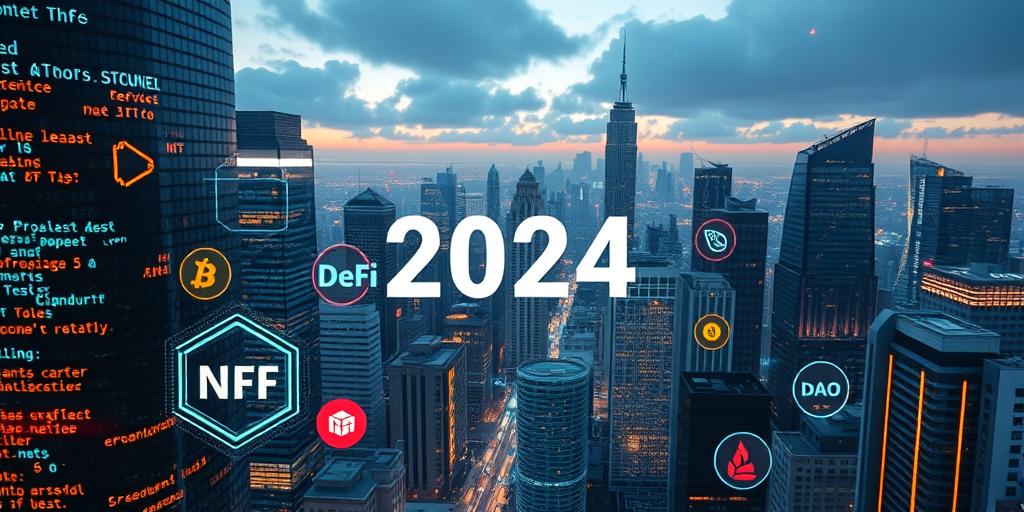Smart contracts have revolutionized how we interact with technology, automating agreements and transactions with unprecedented efficiency and transparency. But the journey doesn’t stop there. The world of smart contracts is constantly evolving, bringing exciting new features and applications to the forefront in 2024.
Key Developments in Smart Contract Technology
The technological landscape surrounding smart contracts is rapidly changing, driven by innovation and the ever-increasing demand for more robust and versatile solutions.
Interoperability and Cross-Chain Communication
One of the most significant advancements in smart contract evolution 2024 is the emergence of interoperability and cross-chain communication. Imagine a world where smart contracts can seamlessly interact across different blockchains, unlocking a vast universe of possibilities. This is becoming a reality thanks to technologies like cross-chain bridges and interoperability protocols. These solutions enable data and value to flow freely between distinct blockchain networks, expanding the reach and utility of smart contracts.
Privacy-Enhancing Technologies
In an era where data privacy is paramount, new smart contract features 2024 are prioritizing security. Zero-knowledge proofs and homomorphic encryption are emerging as powerful tools for enhancing privacy within smart contracts. These technologies allow for the verification of information without revealing sensitive data, paving the way for more secure and private transactions.
Scalability Solutions
As the adoption of smart contracts grows, scalability becomes a critical concern. Smart contract technology advancements are addressing this challenge through innovative solutions like sharding and layer-2 scaling solutions. These technologies optimize transaction processing and improve the overall performance of smart contract platforms, enabling them to handle increased demand and complex transactions.
Security Enhancements
Security remains a top priority in the world of smart contracts. Researchers and developers are constantly working to improve the security of smart contract code, identifying and addressing vulnerabilities. Formal verification techniques, automated security audits, and advanced bug detection tools are playing a crucial role in enhancing the resilience of smart contracts against malicious attacks.
Emerging Use Cases for Smart Contracts
The applications of smart contracts are expanding beyond traditional financial transactions, creating a ripple effect across various industries.
Decentralized Finance (DeFi)
Blockchain smart contract trends 2024 are heavily influenced by the booming DeFi ecosystem. Decentralized finance, powered by smart contracts, is transforming the financial landscape, providing access to innovative financial services like lending, borrowing, and trading without the need for intermediaries.
Supply Chain Management
Smart contracts are revolutionizing supply chain management by streamlining processes and enhancing transparency. From tracking goods and materials to automating payments, smart contracts enable real-time visibility and improve efficiency throughout the entire supply chain.
Identity and Access Management
Smart contracts are poised to transform how we manage identities and access control. Decentralized identity systems built on smart contracts offer greater control over personal data, empowering individuals to manage their digital identities securely and efficiently.
Healthcare and Data Management
The healthcare industry is embracing smart contracts for secure and efficient data management. Smart contracts can automate medical records management, facilitate secure data sharing between healthcare providers, and streamline insurance claims processing.
Challenges and Opportunities
While smart contracts offer immense potential, they also present unique challenges that require careful consideration.
Regulation and Compliance
As smart contracts become more mainstream, regulatory frameworks are evolving to address the unique aspects of this technology. Ensuring compliance with relevant regulations is crucial for the long-term success of smart contract applications.
Security and Auditability
The security of smart contracts is paramount, as vulnerabilities can lead to significant financial losses. Rigorous security audits, continuous monitoring, and the development of robust security measures are essential for maintaining the integrity of smart contracts.
User Adoption and Education
The widespread adoption of smart contracts requires a concerted effort to educate users about their capabilities and benefits. Simple interfaces, clear documentation, and user-friendly platforms will be key to bridging the gap between technology and everyday users.
The Future of Smart Contracts: Predictions for the Future
The future of smart contracts is bright, with exciting developments on the horizon.
Predictions for the Future
We can expect to see even greater interoperability, enhanced security, and the emergence of new use cases for smart contracts in diverse industries. As the technology matures, it will become more accessible and user-friendly, leading to widespread adoption.
Impact on Various Industries
Smart contracts are poised to revolutionize industries ranging from finance and healthcare to supply chain management and government services. Their ability to automate processes, improve transparency, and reduce costs will have a profound impact on the way we live and work.
Call to Action
The world of smart contracts is evolving at an unprecedented pace. Now is the time to explore the possibilities, embrace the potential, and contribute to the development of this transformative technology. Let’s work together to unlock the full potential of smart contracts and shape a future where technology empowers us to build a better tomorrow.




